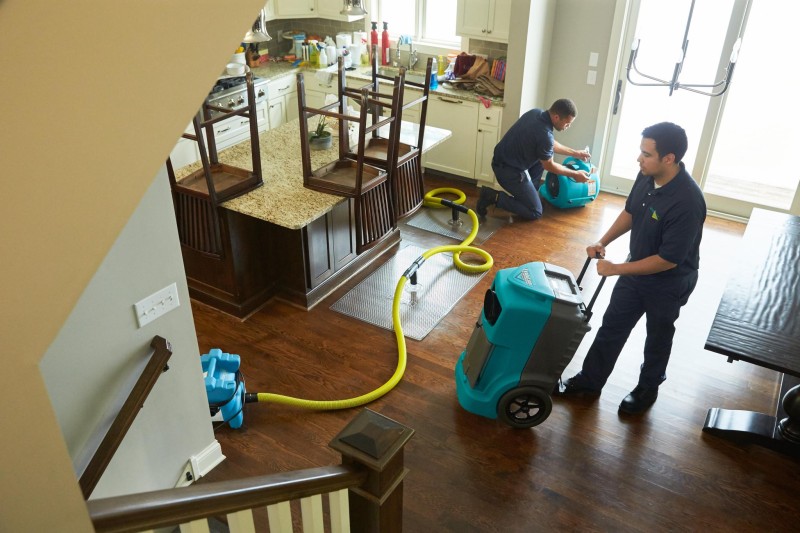From sewage backup and plumbing leaks to flooding and natural disasters, water damage is one of the most common and often destructive issues you can deal with as a homeowner. Acting quickly to mitigate the issue is crucial to preventing permanent loss, especially if you have a flooded basement or a highly trafficked area of your home.
When flooding or water damage threatens your home, the experts at ServiceMaster Restore are there to help you recover. Water extraction is one of the necessary steps taken to avoid extensive damage to your home. Learn more about what water extraction services entail and why emergency water extraction services may be necessary after water damage has occurred.
WHAT IS WATER EXTRACTION?
Water extraction is the process used to remove excess or standing water from your home or property. Restoration companies that specialize in water extraction work to minimize any damage to a home or business after flooding has happened. During the water extraction process, the restoration company's goal is not only to minimize water damage but to also:
- Reduce the risk of permanent damage to valuables.
- Prevent mould growth that could pose a serious health risk.
- Restore the property to its former condition.
WHAT DOES THE WATER EXTRACTION PROCESS INVOLVE?
Water extraction from your home or property can be a complicated process best left to the professionals. However, understanding the process needed for water removal is crucial to know what areas of your home can be salvaged and what you can do to restore your home.
- Stop the flow of water: Water removal cannot begin until the source of unwanted water is stopped This can be as simple as closing off the main water pipe to your home, although certain damage may require the help of emergency services to turn off.
- Drain the water: Removing visible pockets of water is essential to avoid further damage to your property. This can be accomplished by using a wet vacuum or a pump to help drain the water away from your home. Ensure that all utility lines, such as electricity, have been shut off to avoid harming yourself or a loved one.
- Remove non-visible water: While you may have successfully removed visible water from your home, the damage may continue without you knowing. Water can remain hidden within carpeting, which can lead to mould formation or damage to your building structure. In certain situations, water may also find its way into areas that it shouldn't, such as walls.
A professional has special water extraction tools that can ensure that all water is removed from your home to avoid further water damage. While you may have a wet vacuum and a fan, there are countless areas that may be missed, or the damage may be more extensive than your eyes can see, leading to more costly problems down the road.
ARE WATER EXTRACTION AND WATER MITIGATION THE SAME THING?
While water damage services often involve both water extraction and mitigation, each process involves different methods. When a professional restoration company like ServiceMaster Restore provides water damage services, they'll use various techniques to prevent further damage, including both extraction and mitigation. The differences between water extraction and water mitigation services are as follows:
WATER EXTRACTION
Water extraction involves removing excess water from a home through the use of submersible pumps and industrial vacuums. The Centers for Disease Control and Prevention (CDC) advises that mould can grow as quickly as 24 to 48 hours after a home has flooded, which can lead to serious health complications such as asthma attacks, allergic reactions and severe infections in people with weakened immune systems. For that reason, water extraction is a crucial step that should be conducted by professionals as soon as possible.
WATER MITIGATION
After a restoration company has provided extensive water extraction services, they'll take additional actions as necessary to prevent further damage. Based on the severity of the water damage, the water mitigation process may involve:
- Removing unsalvageable materials.
- Removing affected structures such as drywall, flooring and upholstered furniture.
- Cleaning and disinfecting all affected areas.
- Deodorizing the home.
- Drying out the home's structural components with the appropriate equipment.
- Conducting humidity and moisture testing to ensure all issues have been resolved.
THE IMPORTANCE OF EMERGENCY WATER EXTRACTION AFTER WATER DAMAGE
Water damage can be disruptive and disastrous to any home. When the unexpected happens, the situation must be addressed quickly to help prevent major destruction. Even a small amount of water damage can put a home at risk for toxic mould growth, while a significant amount of water damage can threaten the integrity of a home's structure. An emergency water extraction company should be called to extract all excess water as soon as possible.
The team at ServiceMaster Restore wants to help you know how to respond if the unthinkable happens. There are specific steps you can take to keep your property and loved ones protected if significant water damage threatens your home. Learn what to do after a flood to minimize the risk of safety hazards and how you should document all damages to avoid complications when filing an insurance claim.
CONTACT A WATER EXTRACTION PROFESSIONAL TODAY
If you're ever in need of water extraction services, don't hesitate to contact ServiceMaster Restore. Available 24/7 every day of the year, our technicians work to get your life back to normal fast. Contact us today to learn more about our water damage restoration services.

